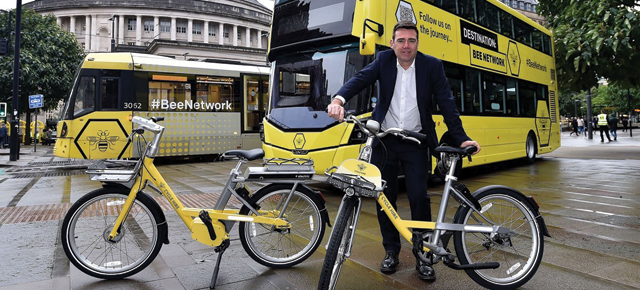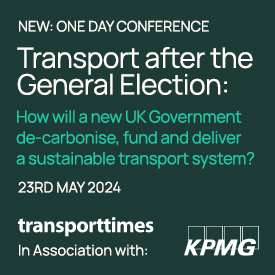Ahead of this week’s spending review, chancellor Rishi Sunak announced the seven ‘metro mayor’ city regions will share £7bn over five years

Ahead of this week’s spending review, the Treasury and chancellor Rishi Sunak confirmed a multi-billion pound overhaul of local transport in his spending review this week with almost £7bn allocated for transport improvements in the city regions.
The majority of the funding (£5.7bn) has been allocated from the City Region Sustainable Transport Settlements (CRSTS) scheme. When announced in the summer, this was expected to comprise a funding pot worth £4.2bn over five years.
A further £1.2bn will be allocated from funding for buses and cycling infrastructure that was previously announced by prime minister Boris Johnson as part of England’s National Bus Strategy.
The seven ‘city region’ mayoral combined authority areas will each receive a share of the funding pot. The North East Combined Authority, which uniquely does not have an elected mayor, was not eligible for the funding round.
The funding is allocated as follows: Greater Manchester – £1.07bn; West Midlands – £1.05bn; West Yorkshire – £830m; Liverpool City Region – £710m; South Yorkshire – £570m; West of England – £540m; and Tees Valley – £310m. The funding will be allocated in installments over a five-year period.
Great cities need great transport and that is why we’re investing billions to improve connections in our city regions as we level up opportunities across the country
“Great cities need great transport and that is why we’re investing billions to improve connections in our city regions as we level up opportunities across the country,” said Sunak at the weekend. “There is no reason why somebody working in the north and Midlands should have to wait several times longer for their bus or train to arrive in the morning compared to a commuter in the capital.
“This transport revolution will help redress that imbalance as we modernise our local transport networks so they are fit for our great cities and those people who live and work in them.”
Reaction
Greater Manchester will be the greatest beneficiary of the funding and mayor Andy Burnham hailed it as a demonstration that regional leaders and Whitehall were at last now more aligned in their thinking. He described the region’s pitch for funding from the CRSTS as a powerful case for a London-style public transport system. “This is a big down payment on it,” he added.
This is infrastructure and what we need is services as well
However, he said the plan was only halfway there and he was awaiting the announcement of funding from the region’s Bus Service Improvement Plan bid to determine whether Greater Manchester would be able to fully press ahead with its ambitious plans for the integrated Bee Network. “This is infrastructure and what we need is services as well,” Burnham said.
Another big winner is the West Midlands which placed expansion of the region’s West Midlands Metro light rail system at the heart of its plans. “Whilst no final decisions have been made on where the money will be spent, it is no secret that the expansion of our tram network is a key priority,” said Andy Street, the region’s mayor.
In South Yorkshire mayor Dan Jarvis said his region deserved a “world-class” transport network and he was pleased to see the funding confirmed.
“I’ve fought hard to secure the transformative investment we need for South Yorkshire and repeatedly called on ministers to match my ambitions,” he said.
“That message has finally been heard by government. The money we have secured will get South Yorkshire moving and help deliver a public transport revolution – benefitting all parts of our region and making public transport the first choice for travel.” .
WHERE THE £7BN IS GOING
Greater Manchester – £1.07bn
West Midlands – £1.05bn
West Yorkshire – £830m
Liverpool City Region – £710m
South Yorkshire – £570m
West of England – £540m
Tees Valley – £310m
This article appears in the latest issue of Passenger Transport.
DON’T MISS OUT – GET YOUR COPY! – click here to subscribe!







